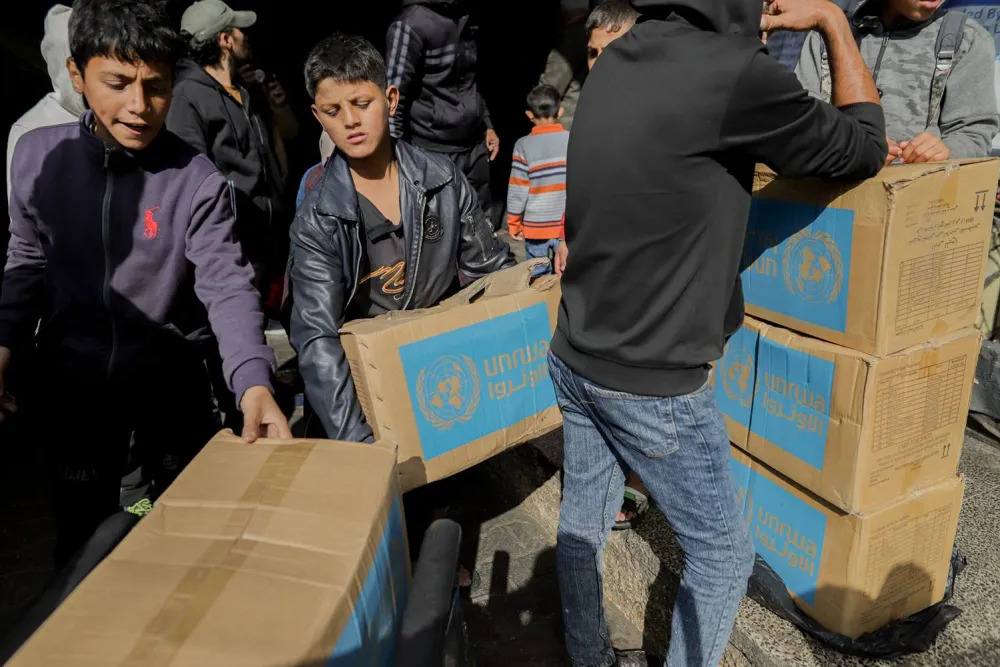UNRWA Ban Goes into Effect
Israel’s ban on UNRWA, the primary United Nations aid agency for Palestinians, went into effect on Jan. 30, and it’s expected to have rippling consequences across the region—particularly in the war-ravaged Gaza Strip. UNRWA is now barred from operating on Israeli soil, and Israeli authorities are prohibited from interacting with the U.N. agency.
The ban, a product of two pieces of legislation passed by the Knesset last October, is going into force amid a fragile cease-fire agreement between Israel and Hamas, and it threatens to inject more instability into an already precarious situation.
“Across the Gaza Strip, Palestinians are turning to UNRWA—the agency they have known all their lives—for support,” UNRWA chief Philippe Lazzarini told the U.N. Security Council on Jan. 28. “Curtailing our operations now—outside a political process, and when trust in the international community is so low—will undermine the cease-fire. It will sabotage Gaza’s recovery and political transition.”
What is UNRWA?
Formally known as the United Nations Relief and Works Agency for Palestine Refugees in the Near East, UNRWA provides everything from food and education to health care and shelter for millions of Palestinians in the Gaza Strip, occupied West Bank, East Jerusalem, Lebanon, Jordan, and Syria. It was founded in 1949 to aid Palestinian refugees who fled or were expelled from their homes because of the 1948 Arab-Israeli war.
The U.N. agency, which Lazzarini said has provided roughly two-thirds of all food aid to Gaza since the war began and 60 percent of the food since the cease-fire began, is widely viewed as a crucial lifeline for Palestinians. At Tuesday’s U.N. Security Council meeting, the United States was the only member to express support for Israel banning UNRWA. Meanwhile, the United Kingdom’s deputy ambassador to the U.N., James Kariuki, called for UNRWA’s “vital work” in providing access to education and health care to be “protected” in Gaza, the occupied West Bank, and East Jerusalem.
Why is the ban happening?
Israel, which has clashed with the U.N. for years, has accused UNRWA of being “infiltrated by Hamas” and alleged that seven of the agency’s employees participated in the Oct. 7, 2023, Hamas-led attack on the country.
A U.N. investigation into the allegations found that nine staffers “may have” had affiliations with Hamas, and they were fired as a result. But UNWRA, which has roughly 13,000 staffers in Gaza, has rejected Israel’s claims that it’s been overrun by Hamas. The European Union has also thrown cold water on Israel’s allegations. Many countries paused funding to UNRWA after Israel initially made the accusations of ties to Hamas but have since reversed that decision. U.S. funding to UNRWA has been frozen since last year.
What happens next?
Israel ordered UNRWA to vacate all premises in occupied East Jerusalem and cease its operations in them by Jan. 30. Some international staff have now been forced to leave because of the ban, which has led to issues with obtaining or extending visas. But much remains up in the air in terms of how the ban will be enforced.
“Our clinics across the occupied West Bank including East Jerusalem are open while the humanitarian operation in Gaza continues,” UNRWA posted on X. “We are committed to staying and delivering.”
Juliette Touma, an UNRWA spokesperson, told the Guardian that the agency’s East Jerusalem headquarters is “still there, and the flag is still up” but that they are “in the dark.”
“We have not received any instructions from Israel how the ban will be enforced beyond being told to vacate,” Touma said.
On Jan. 29, Israel’s Supreme Court rejected a petition from a Palestinian human rights group that contested the ban, noting in its ruling that the legislation “prohibits UNRWA activity only on the sovereign territory of the state of Israel” but not in Gaza and the West Bank.
Still, the ban is expected to make it far more difficult for UNRWA to deliver aid to Gaza, as bringing assistance into the enclave requires coordination with Israeli authorities, which is now prohibited by law. “The effects are not going to be all felt immediately, but they’re going to magnify and amplify in waves as time goes on,” Daniel Forti, a senior analyst at the International Crisis Group, told SitRep.
“Half of the international aid that’s been brought into Gaza since the beginning of the Oct. 7 war is likely going to stop. Medical consultations are likely going to stop,” Forti said. “It’s very hard to see how this is going to bring more stability to Gaza at a time when, just a few days after a cease-fire, that’s all the Palestinian people really want.”
Israel has contended that other agencies and organizations can step in for UNRWA. “There are multiple alternative organizations to UNRWA—including U.N. agencies, international NGOs, and foreign countries—that are already operating to facilitate humanitarian aid in the Gaza Strip,” said Oren Marmorstein, a spokesperson for Israel’s foreign ministry.
But aid organizations and experts say UNRWA cannot be easily replaced. “No other organization can replace UNRWA’s health provision in Gaza and the West Bank,” Médecins Sans Frontières posted on X.
Suggestions that “any other agencies and organizations, including within the U.N. system, can serve as a replacement for UNRWA are just incorrect,” Forti said. This is both because of the scope of UNRWA’s mandate and the fact that, in addition to providing lifesaving humanitarian services daily, Forti said, the agency is the main provider of health care and education for Palestinian in Gaza.
“It’s impossible to say that any organization could quickly or sustainably step into the void,” Forti said.

